


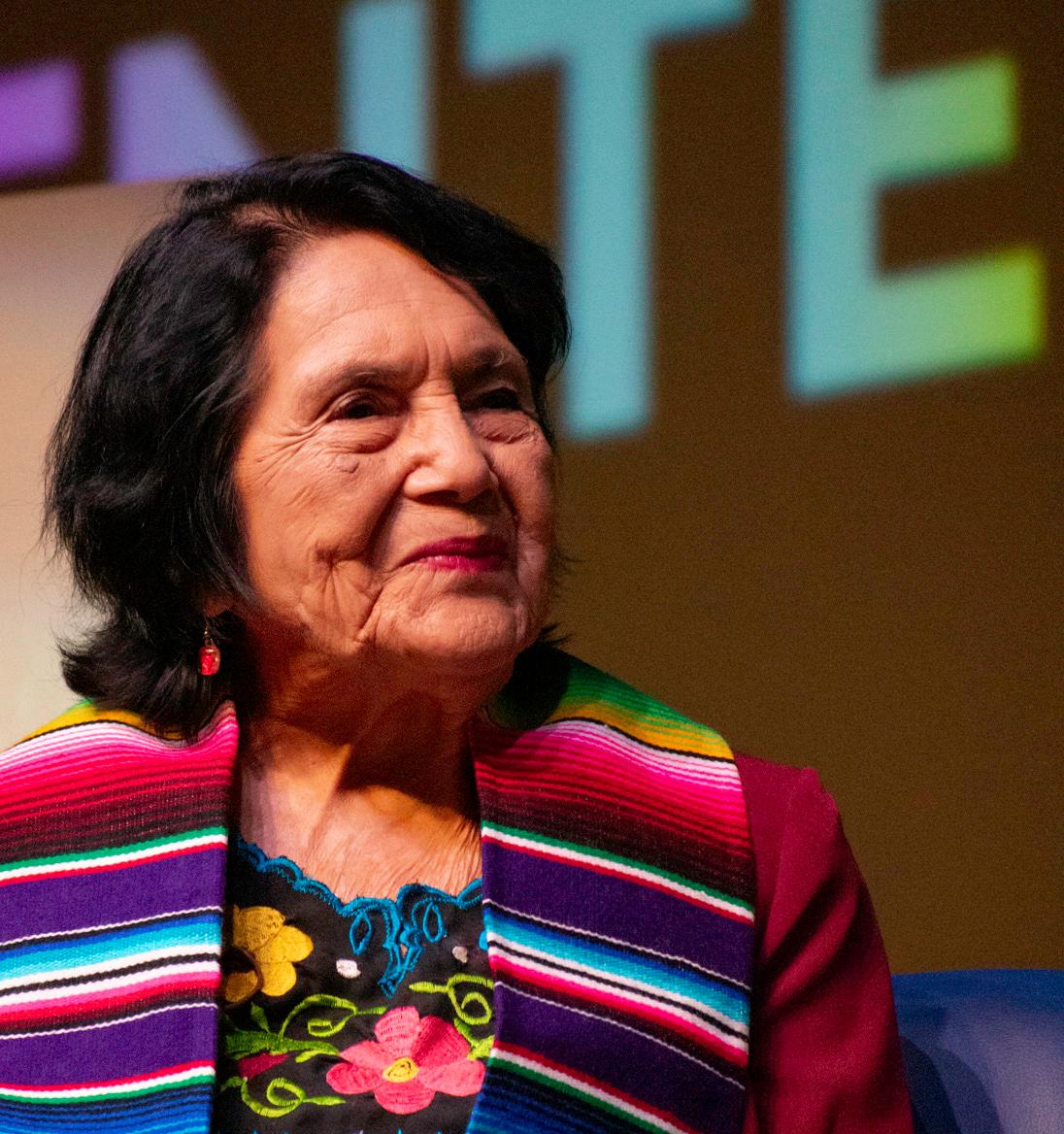
Stockton








Stockton



BY ANDREA BALTODANO Editor-in-Chief
Dolores Huerta returned to her hometown Thursday, calling on Delta College students to carry forward the fight for justice through civic engagement, nonviolence and unity.
The 95-year-old civil rights leader, who co-founded the United Farm Workers alongside César Chávez, addressed a near-capacity crowd in Ath- erton Auditorium. The event, “Voices of DoloresChange: Huerta
Speaks to the Next Generation,” was part of Delta’s annual observance of Hispanic Heritage Month. It was organized by the Puente Project, which supports Latino students through mentorship and transfer preparation, and the Cultural Awareness Program, which brings speakers and cultural programming to campus.
Stockton College — the predecessor to Delta — and how classmates often anglicized their names to avoid discrimination. Those experiences, she said, underscored the need for schools to teach ethnic studies so students can “fend off the racism that they suffer.”
“They can cut all the flowers, but they can’t hold back the spring.”
- Dolores Huerta
Her first organizing efforts, registering voters with the Community Service Organization, a Mexican-American self-help group that Huerta co-found- ed in the 1950s to combat discrimination, economic hardship and voter withinsuppression Latino communities. It showed her how everyday people could change policy.“That was the first action we took,” she said. “And that is really important, because a lot of young people don’t think voting is important.”

Huerta’s message centered on one theme: change is still possible, but only if young people step forward.
“The people we elect are the ones who make the laws that govern us,” Huerta said. “We have to use our voices and our votes.”
Huerta linked her call to action to Proposition 50, the redistricting measure on California’s 2025 ballot. She told students the initiative could help “guarantee” more representative congressional districts and shift political power toward those willing to invest in health care, education and immigrant rights.
“Right now we have a chance to do that,” Huerta said, urging the audience to begin preparing for the 2026 elections by organizing around Prop. 50.
The event, moderated by Delta history professor Dr. Sarah Seekatz and Board of Trustees President Janet Rivera, brought Huerta back to the city where she first studied in the 1940s. She recalled being one of only a handful of Latino students at
Huerta also spoke on women’s rights, saying she believes “we will never have peace in the world until women take power.” She shared lessons from her mother — a businesswoman who taught her to be financially independent — and later encounters that shaped her views on reproductive rights.
“If a woman decides to have an abortion, that is her business,” Huerta said, adding that she struggled with the issue until guided by theologians who emphasized personal choice.
She linked that stance to broader fights over diversity, equity and inclusion policies, warning students that efforts to roll them back are attempts to silence marginalized groups.
Huerta also reaffirmed her sup- port for the LGBTQ+ community.
“We’ve got to end discrimination against everybody,” she said. “All people need to be respected.”
Huerta, long known for her discipline in nonviolence, told students that opponents “want us to use vi-
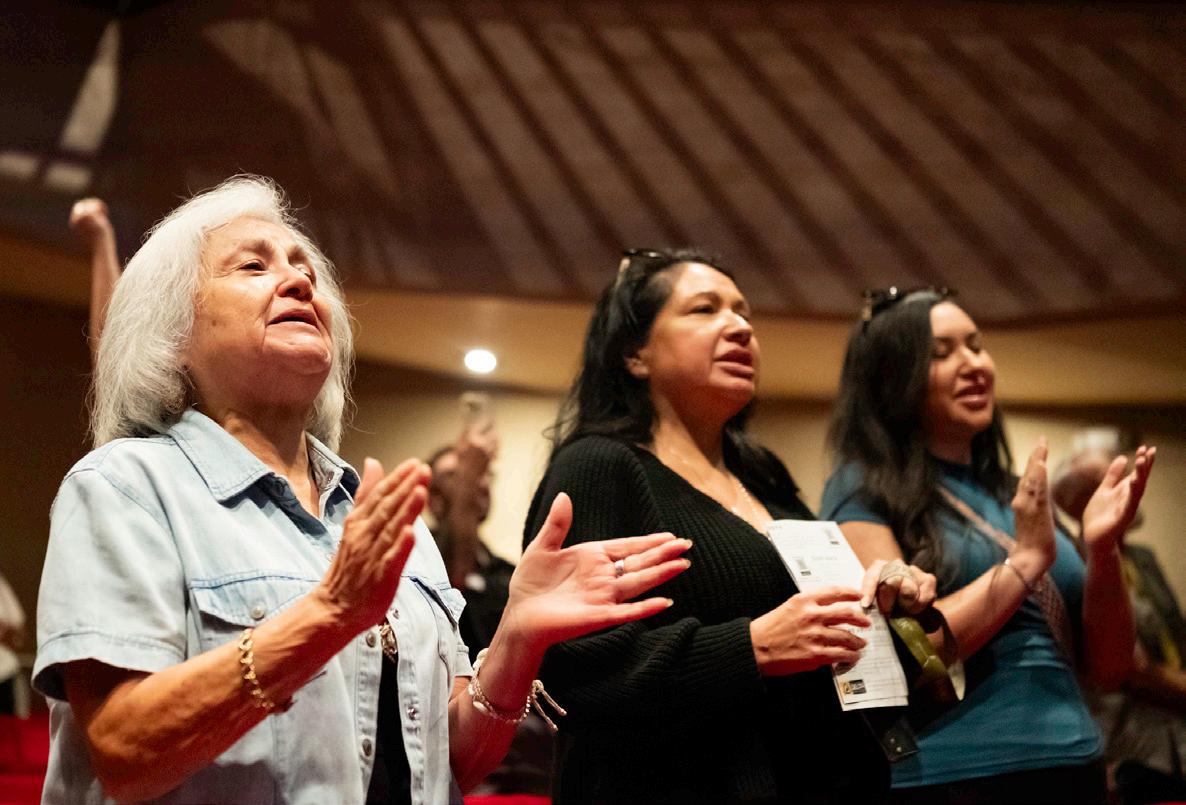
olence” so they can justify repression. Instead, she urged continued marches, vigils and boycotts.
“Voting again is the best method right now,” she said.
The message resonated. Gustavo Gonzalez, an ethnic studies teacher at Edison High School, said he wanted his students to see how someone from Stockton could help transform the Central Valley.
“We talk about Dolores Huerta and how she helped organize to make conditions better for farmworkers,” González said. “I hope students can see how change is possible if you can
connect and work with others who believe in a good cause.”
At Delta, Dr. Beto Gutiérrez, professor of Chicano studies, called Huerta’s appearance “extremely symbolic.”
“It’s the passing of the torch,” he said. “The question is: she’s passing the torch, now it’s up to the students to want to receive it.”
Huerta closed with both urgency and hope, reminding students that rights won through decades of struggle cannot be taken for granted.
Whether in classrooms, on picket lines, or in the voting booth, she told Delta students that democracy depends on their participation.
“This is our moment right now,” Huerta said. “We have to convince ourselves that we can do it.”
Month
EverySeptember, the United States sets aside a month to celebrate Hispanic heritage. The parades, music and food highlight the cultural richness people of Latinx heritage bring to this country, but the meaning runs deeper than celebration.
For Delta College, it is a reminder of identity, responsibility and vulnerability.
Delta is a Hispanic-Serving Institution. More than 51 percent of our student population identifies as Hispanic. That makes us part of a national network of colleges recognized not just for demographics but for their mission: to expand opportunity and equity for students who have historically faced barriers to higher education.
That status, however, is now under threat. President Donald J. Trump’s administration has targeted funding for Hispanic-Serving Institutions and other programs that support minority students. The potential loss puts colleges like Delta in the crosshairs, jeopardizing federal support that sustains scholarships, counseling, tutoring and initiatives tailored to Latinx and other underrepresented students.
This reality framed the backdrop when civil rights leader Dolores Huerta spoke on campus in late September. At 95, she reminded students progress is fragile and only secure if each generation defends it.
“The people we elect are the ones who make the laws that govern us,” Huerta said to a packed Atherton Auditorium. “We have to use our voices and our votes.”
The Collegian is the student newspaper of San Joaquin Delta College in Stockton, Calif. The paper is published six times a semester.
As a First Amendment newspaper we pride ourselves on a commitment to the students of Delta College while maintaining independence.
We reinvigorate the credo that the newspaper speaks for the students, checks abuses of power and stands vigilant in the protection of democracy and free speech.



bolic, and a living reminder that rights, representation and resources are never guaranteed. Just as she organized farmwork ers to demand fair wages in California’s fields, today’s students must recognize the stakes of their own moment. For Delta, protecting the Hispanic-Serving Institution designation isn’t an abstract policy debate, it’s a matter of survival for programs that keep doors open for more than half the student body.
Hispanic Heritage Month should be about more than looking back. It’s about preparing to defend the legacy that pioneers like Huerta built. It’s about making sure that future students — first-generation college students, immigrant families, children of farmworkers — have the same or better opportunities than we do today.
threaten programs that serve our communities. It also means seeing ourselves not as passive beneficiaries of heritage, but as active stewards of it.
At Delta, Hispanic students are the majority, but majority does not always mean security. Our voices matter most when we use them collectively. As Huerta has spent a lifetime teaching, change comes not from waiting for leaders to act, but from communities demanding action together.
Hispanic Heritage Month is a celebration, but right now it’s also a call to vigilance. The progress of the past can only continue if we are willing to fight for it in the present. For Delta students, that fight begins here, with us.
BY ANDREA BALTODANO Editor-in-Chief
Janet Rivera still remembers the campaign she never thought she would win. In 1994, a teachers union colleague urged her to run for Delta College Board of Trustees. She found herself on the ballot against two well-endorsed men, Rivera said, one decades older and the other decades younger.
She said she leaned on community ties and her political instincts, and won with 76 percent of the vote. Thirty years later, Rivera has become the longest-serving trustee in Delta’s history. Now, she says her current term will be her last.
“I’m 74 years old. We need the new blood,” Rivera said with a laugh, her tone equal parts proud and relieved. “I have to tell you how proud I am of our board that we have now…To have that is a blessing for us.”
For more than 30 years, Rivera has been a fixture at Delta College: the longest-serving trustee in the school’s history and one of the region’s most visible Latina leaders. First elected in 1994, she has overseen bond measures that expanded Delta into Mountain House and Lodi, pushed for programs like Passport to College that promised tuition to local fifth graders, and championed the college’s designation as a Hispanic-Serving Institution.
Beyond the campus, she has been a steadfast advocate for equity, safety and student success, often reminding colleagues that trustees must put students first.
Rivera’s journey into public service began long before she imagined holding office. At 8 years old, she shook John F. Kennedy’s hand, wrote him a letter about migrant families, and to her astonishment, he wrote back
That early taste of civic engagement stayed with her. Decades later, while attending a teachers’ union conference, a colleague encouraged her to run for Delta’s board. She hesitated but entered the race, ultimately capturing more than three-quarters of the vote.
“I knew I had the Latino vote, the Black vote, the Asian vote, the female vote,” she remembered. “I used my political sense, and I won.”
Rivera’s fingerprints can be found on nearly every major project Delta has

undertaken in the last three decades. She supported Measure L in 2004, which funded expansions to Mountain House and Lodi. More recently, she backed Measure K, the $598 million bond voters approved in 2024 to modernize classrooms, labs and career training facilities.
She is equally proud of programs such as Passport to College, launched in the mid-2000s, which invited thousands of fifth graders from local schools to sign a pledge to stay in school and, in return, guaranteed them two years of free tuition at Delta once they graduated. The program reached more than 10,000 children in its first cohort and was recognized statewide as a model for access before being phased out a decade later.
Rivera also points to Delta’s designation as a Hispanic-Serving Institution,
Read more stories, including the continuation of “Janet Rivera, Delta’s longest-serving trustee, prepares to step down” at deltacollegian.net/ news
achieved in 2004 when Hispanic enrollment surpassed one-quarter of the student body. Today, more than half of Delta’s students identify as Hispanic or Latino.
That status not only affirmed the college’s identity but also opened the door to grants and resources designed to support student success, according to Delta College documents.
“Anywhere I go, I brag about Delta College,” Rivera said. “Bring your family, bring your kids. We’re doing important work here.”
Rivera’s long tenure also meant weathering storms. She recalls campus safety concerns that led to more blue emergency phones across campus in spots she deemed “unsafe”. But the episode that still stings most was the hiring of Dr. Jeff Marsee, who became Delta’s superintendent/president in 2011.
Faculty swiftly rebelled against his leadership, with 96 percent voting no confidence. Within months, the board placed him on paid administrative leave and eventually approved a costly buyout of his contract, according to Collegian archives.
“Hiring the wrong president was one of my biggest challenges,” Rivera said. “I had a sense he wasn’t going to be a good fit, and unfortunately it came to fruition.”
The turbulence tested her resolve. There were moments when she considered stepping away, but faith and stubbornness, she said, kept her in the chair.
Rivera often frames her career through the lens of identity. She has seen labels shift: Mexican American, Chicana, Latina, Hispanic. Through it all, she has never wavered in who she is.
“I’m honored, humbled,” she said. “I always call myself a Latina warrior. And there were warriors before me who were never recognized.”
Rivera pointed to two honors that define her career. “I think my proudest moment was when I received the Mexican American Hall of Fame Award in 2002,” she said, recalling how meaningful it felt near the end of her first term as trustee.
Years before, the Associated Student Body came before the board with a challenge: if trustees wanted to understand students, they should try living a student’s reality. The request was simple but telling: register for a class, go through the process, feel the wait times and paperwork firsthand. Rivera was the only trustee who accepted.
“I went through the whole process to see what it was like,” she said. “Jesus, it was hard. But you know what? That put me in their shoes. You have to feel it.”
The students later honored her with a recognition of their own back in 1999.
“It’s the only student body award they’ve ever given a trustee, and I have it at home,” Rivera said. “That’s the one I keep, the shining star, yeah, because that’s from the students. And that says a lot.”
BY JARRED WRIGHT Senior Staff Writer
Effective Fall 2025, Delta has replaced the IGETC and CSU-GE Breadth transfer pathways with the new hybrid Cal-GETC pattern.
The now-defunct UC pathway, the Intersegmental General Education Curriculum (IGETC) and the adjacent CSU pathway, the California State University General Education (CSU-GE), were separate patterns guiding community college transfer students to choose that which aligned with their intended school of transfer.
Following the 2021 passage of AB 928, the Student Transfer Achievement Reform (STAR) Act, the Cal-GETC pathway removes the need to choose.
According to Delta’s 2025-26 course catalog, “the goal is to improve transfer efficiency and shorten time-to-degree completion.”
The replacement of the older patterns with Cal-GETC does not restrict students enrolled before the Fall semester following those patterns.
“If you were a student at Delta College prior to Fall 2025, you can still follow the old pathway. This is what’s known as ‘catalog rights.’ It’s only fair that students who were previously enrolled at the College be able to finish a pathway they’ve already started,” said a campus-wide general information email.
The STAR act mandated that the units for the new pathway cannot exceed those that existed under IGETC, a way of encouraging faster transfer and degree-completion.
Previously, the requirements for students transferring from Delta to a CSU differed from those transferring to a UC.
Cal-GETC draws from both of the previous pathways, but maintains the
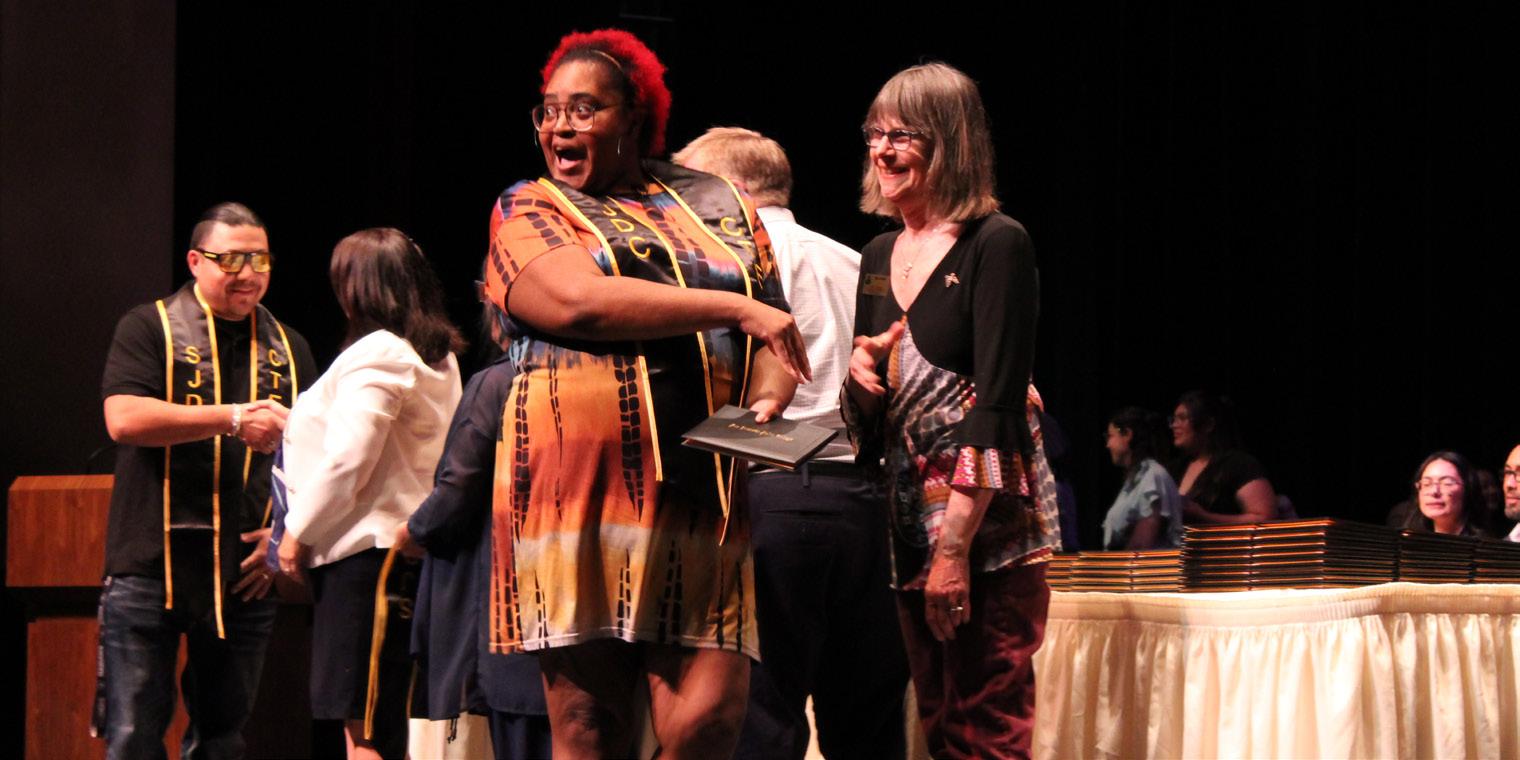
34 unit minimum required by IGETC, with some CSU-GE influences changes.
“I imagine the decisions were shaped by the fact that Cal-GETC combines two different GE patterns (CSU GE and IGETC), each rooted in systems with their own educational philosophies and priorities. Naturally, that meant compromise,” says Raichelle Strickland, Delta’s Transfer and Articulation Officer.
For students hoping to transfer to a private university outside of the UC or CSU systems, acceptance of the CalGETC GE pattern varies.
As an example, the University of the Pacific (UOP) has previously accepted both the CSU-GE and IGETC patterns but its catalog has not been updated to reflect any changes following the adoption of Cal-GETC.
However, UOP is listed as a participating university that has “entered into formal memoranda of understanding
with the California Community Colleges and accept transfer students consistent with the terms of the Associate Degree for Transfer (ADT),” according to the California Community Colleges (CCC) website.
In order for it to be earned, the ADT requires the completion of Cal-GETC, but students have the option of opting out of Cal-GETC if they wish to pursue a specific pathway particular to their college or major of choice.
UC Berkeley too encourages but does not always require Cal-GETC for transfer, specifically “for students applying to the College of Letters and Science and the College of Computing, Data Science and Society,” owing to its simpler 7-course general education pattern.
Instead, Cal-GETC provides a starting point for students to fulfill requirements that may be necessary across UCs and CSUs, but not sufficient when including specific major requirements.
According to the website of the Intersegmental Committee of the Academic Senates — the group overseeing the implementation of Cal-GETC and representing the UC, CSU, and CCC systems — “some individual colleges or majors within a UC campus may not accept or recommend Cal-GETC to fulfill all of their general education requirements.”
The Cal-GETC pattern differs from Delta’s General Education requirements for a local associate degree whose requirements do not meet Cal-GETC transfer standards.
However, the standards for earning an associate degree are designed to align with Cal-GETC to minimize confusion
According to an article written by the Academic Senate of CCC in 2022, “Aligning the structure of associate degree general education requirements with the proposed CalGETC pathway while utilizing guidance similar to current Title 5 §55063 requirements will allow colleges to identify courses within each area that meet local general education requirements in addition to those approved for a CalGETC pathway.”
“Even if your current goal is to earn an associate degree only, you’ll still be completing classes that can support a future transfer without taking unnecessary courses,” said Alex Brietler, Delta’s director of Marketing and Communications.
For students who do intend to transfer and need to navigate courses, the Cal-GETC ASSIST.org tool maps which courses will transfer to specific universities and Delta’s counseling services are available Monday through Friday from 8 a.m. to 4 p.m. or walk-ins to help students create a plan for transfer.
BY ZACKARY KIRK-NEWTON Editor-in-Chief
The moon shone brightly over the delta college koi pond, each koi a silent witness to the newfound stillness of a campus at rest, as they did every night. However this night would not be like any other as the sound of an unscrewing water bottle broke through the silence and the light of a phone camera penetrated the water.
On Sept. 19 a video was uploaded by the TikTok account, Stocktivites, with the caption “Bruh, who pissed in the Delta college koi pond?”
The video, which appears to be a reupload of a video from another account, shows someone standing at the rim of the Delta College koi pond unleashing a stream of water into the pond as audio from the USA drama “Dexter” plays. “The bay harbor butcher, you know the nickname, and you know what he did, dismembered his victims bagged the bloody bits and tossed them in the,” says the narration.
Just nine seconds long, the video raises far more questions than it answers: who did this? Why did they do it? Did they actually piss in the koi pond?
“We were able to confirm… they did not actually urinate into the pond,” said Alex Breitler, Director of Marketing and Communication, noting that it went far from unnoticed. “This particular incident was captured by the cameras, which is how we know that it was staged. They used water bottles.”
They may not have actually urinated into the pond, but that still leaves the question, why?
The answer for that is fairly obvious once you take a look at the video’s platform of origin, TikTok, where videos of various and sundry pissers dart the landscape.
The trend — which began in early September — has led to hundreds of videos online all with the same formula, a pisser (either fake, like delta’s, or the genuine article), a place to piss, and audio from “Dexter.”
A few have even spawned piss-hunters that take up the role of an opposition to the pissers, pursuing them in an attempt to stop them from further urination.
Despite the confirmation of the staged nature of the incident, Breitler said the police are still looking into it.
“The Delta College Police Department is investigating,” said Breitler.
BY ANDREA BALTODANO
California voters face a pivotal choice this November: whether to hand redis tricting power back to the Legislature for the first time in more than a decade.
“[President Donald J. Trump,] you have poked the bear and we will punch back,” Newsom said during the first Proposition 50 rally in August. “Don’t mess with the great Golden State.”
Prop. 50, a constitutional amendment on the 2025 ballot, would temporarily override the state’s independent redis tricting commission and allow law makers to redraw congressional maps through the 2030 election.
“California Proposition 50, which is a constitutional amendment, will tem porarily change the districting of Cal ifornia with regard to representation in Congress,” said Dr. Joel Blank, profes sor of political science and pre-law ad visor at San Joaquin Delta College. “It’s going to be for the next three elections: 2026, 2028, and 2030, and Democrats could end up taking five more seats in the state, based on party registration.”
Supporters frame the measure as a necessary counterpunch to Texas, a Re publican-led state that redrew its con gressional maps mid-decade this year to strengthen GOP control. The Texas plan, signed by Gov. Greg Abbott, is projected to flip several Democratic-leaning seats and has drawn multiple court challenges over alleged gerrymandering and dilu tion of minority voting power.
In San Joaquin County, Supervisor Steve Ding authored a resolution opposing Proposition 50, arguing that the measure disrespects voters who helped shape the state’s current district maps. The Board of Supervisors narrowly voted down the resolution in August, but the debate underscored local resistance to Sacramento’s plan.
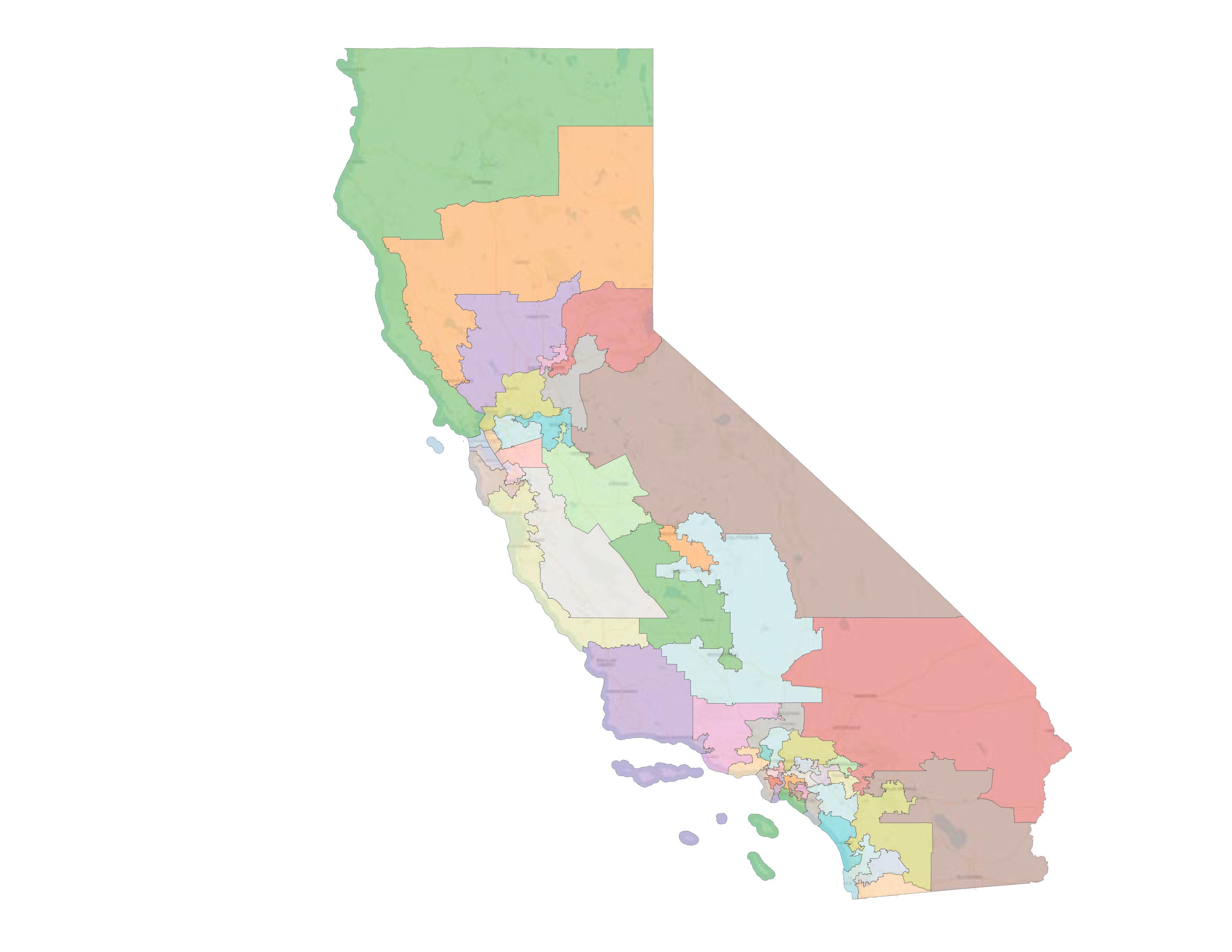
makes California unique is that we have an independent commission … and many argue that the districts have been fairly drawn.”
“A vote for this resolution is saying you respect the community who was at the table and who drew the lines,” Ding said during the meeting. “This is saying you respect the voters more than the government officials in Sacramento who said, ‘We really don’t care what the voters had to say. We know what’s right.’ We’re tired of being told by Sacramento that they know better.”
California created its citizens’ redis-
If passed, Proposition 50 could tilt several districts more Democratic, particularly in Northern and Central California, as well as parts of the south. Locally, Stockton would be split into three districts, a move Blank said could force candidates to rethink their strategies.
Republican Kevin Lincoln, who has announced another challenge to Rep. Josh Harder in 2026, might instead run in a different district that includes a heavier share of Republican voters, Blank said. But he also warned that undermining the independent process comes with costs.
“Some would argue that to go back
Avalos said the lack of awareness worries her, especially given low youth turnout in special elections.
“Voter turnout is usually highest among people 55 years and older, while fewer young adults tend to vote,” she said. “But this election is crucial to either keep a nonpartisan system or fight back against other states’ gerrymander-
She added that the independent commission, created in 2010, remains little known among students who were children when it formed. “Many people will be hesitant to let lawmakers take over redrawing the maps,” Avalos said. “There’s a long-standing lack of trust and transparency between constituents and their representatives.”
Turnout may ultimately decide Prop. 50’s fate. Special elections typically draw fewer voters, and Republicans may feel greater urgency since their party could lose seats. California Voters Foundation reported that in the 2019 special elections for state Senate, turnout varied dramatically — about 26 percent in district 1 and less than 7 percent in district 33 — underscoring how inconsistent and often low voter engagement can be in off-cycle con-
“California is so overwhelmingly Democratic that I think it favors Democrats,” Blank said, while acknowledging “nothing is sealed until
Nationally, the fight reflects deeper questions about whether nonpartisan redistricting can survive in a polarized era.
ers who feel disenfranchised or upset by the shift could retaliate at the polls. He cautioned that some may punish Democrats by voting for more moderate Republican challengers.
On campus, many students are still learning what Prop 50 would do.
“I would like to say that hopefully about half of the students at Delta are aware of Proposition 50, but I truly don’t know,” said Abby Avalos, a political science major and president of the Politics & Law Club. “During Club Rush and at one of our meetings, I brought it up and many students looked intrigued and wanted to learn more, which means many didn’t know about the proposition.”
“There has been bipartisan support for creating independent commissions across the country,” Blank said. “But what Trump has been trying to do has led to more division. It’s not good for politics or voting.”
For Avalos, the stakes are generational.
“Fair redistricting gives our generation a real say in shaping the future,” she said. “Even though this is a temporary change, we have to think seriously about what it means to step around the independent commission that normally handles this.”
For now, the debate underscores a paradox: California, long a champion of fair maps, is asking voters to decide whether bending the rules is the only way to fight fire with fire.
BY ZACKARY KIRK-NEWTON Editor-in-Chief
For most dogs, the height of adventure is a brief spat with the mailman and the occasional table scrap of indeterminate edibility. So they have to find their own fun like one pup did on the campus of San Joaquin Delta College.
Sadie, a 10-year old black lab, was seen roaming around campus on Sept. 16 from early in the morning into the afternoon. Her tour of campus took her around Shima and Danner, but ended up in the koi pond.
“[Alyssa Suarez, another employee at the food pantry] and I were making our runs, we actually did see the dog ... I wanna say maybe 3:39 in the morning,” said Valerie Valera, who works at the food pantry. “The dog was actually in Shima with everyone and we were trying to direct the dog to campus PD.”
Sadie, now aware of her status as a fugitive of the law, had other plans and instead went to lay down in the shade.
“Once we hit the plaza the dog, kinda just like went underneath a tree and laid down,” said Valera. “We were just thinking she was resting, so we kinda just left her.”
After lounging in the shade for a while, Sadie decided that it was getting a little too hot for her and decided to go to the nearest body of water to cool off — the koi pond.

“I’m not sure what time this happened but at some point Tuesday morning, folks walking by the pond spotted a black dog paddling around,” said Alex Breitler, Director of Marketing and Communications.
Security footage shows Sadie doggy-paddling away in the pond as the koi jet away, no doubt understanding what it must be like to be the protagonist in a
cosmic horror novel.
On Sadie’s second dip in she began to struggle to get out.
“She was trying to climb up on the bricks on the left, but she couldn’t bring her foot up,” said Valera, who noticed the dog in the pond on the way back from the bookstore. “And then someone said she was drowning and right then when I heard that I was like ‘I’m not gonna chance it.’”
Valera leapt into the pond and proceeded to guide Sadie to an edge of the pond where she safely climbed out and was met with Delta Police.
“I got in trouble,” said Valera, who was told by campus police that jumping into the koi pond was a bad idea and that she could’ve gotten hurt.
“But like, my first reaction was, I can’t see a dog in distress,” said Valera. “I grew up around animals, I raised animals, I fostered at least 20 before I started coming to Delta. So like animals hold a special place in my heart especially dogs and if I see any animal in distress and if I think I can help, I’ll try to.”
Sadie’s adventure was not finished when she was rescued from the pond however. Before she could be handed off to Delta Police, she bolted.
“The dog actually took off towards Budd after it got out of the water,” said Valera.
Campus police were eventually able
to track down the dog and get her to the pound.
But that begs the question, who let the dog out? Well, Sadie, according to her owner, let herself out.
“There was some kind of raccoon or skunk on the other side of the fences and she pushed the fence out,” said Brenda Mitchell, Sadie’s owner, who realized that Sadie was missing when she came to feed her on the night of Sept. 14 and began following the trail she left.
Sadie’s trail led Mitchell to a University of the Pacific sorority which helped her in putting up missing posters for the dog, which were eventually seen by Suarez during a tour of the UOP campus on Sept. 16. Suarez recognized Sadie at Delta and called the number.
“Alyssa thought Sadie looked like the dog from the koi pond, so she called, and sure enough it was the same dog. The owner picked her up from the shelter and they are apparently very happy to be reunited,” said Breitler.
After a long few days of adventure, a swim with the fishes and a brief stay in the clink, Sadie was now at home laying in her koi-less pool.
“She jumped right into her little pool,” said Mitchell. “I can’t thank the community enough, if it wasn’t for the students and their sightings I wouldn’t have had any idea of where to find her.”
BY LEVI GOERZEN Sports Editor
As of Sept. 9, the State of California is officially 175 years old. The 31st state to join the Union, California has a rich history and was even its own country for 25 days before it became a state in 1850.
Gov. Gavin Newsom addressed the California Legislature in his 2025 State of the State letter, speaking about the California economy and its being under attack from the Trump Administration.
“The foundation we have built together empowers us to embrace the values that have made California the global center of progress. We imagine — and implement — the future. We build what others say is impossible,” said Newsom.
California has come a long way from its golden beginnings, here are some facts about California’s 175 years of statehood.
• The name California comes from a Spanish Romance Novel titled “Las Sergas de Esplandián,” where there is an island of the same name
• The state capital was originally in San Jose, and moved to Vallejo, then to Sacramento, and moved back to Vallejo before moving to Benicia, and moved back to Sacramento
• There are currently 109 federally recognized Native American tribes in California
• The only native California president was Richard Nixon
• 46 percent of California’s land is owned by the federal government
• California has a population of 39 million, the highest population in the United States
• If California were to secede from the United States of America, it would be the fourth largest economy in the world
• California’s central valley has 1 percent of the United States’ farmland, however produces 8 percent of its agricultural output
• California is home to more than 116 community colleges, 150 private non-profit colleges, 160 for-profit institutions and 170 private for-profit trade schools
• California has the most major professional sports teams of any state, with 15
• California has the most national parks of any state at 9
• Lassen National Park has all 4 major types of volcanoes: shield, plug dome, cinder cone and composite
• California has the highest and lowest points in the continental United States, with the salt flats in Death Valley being the lowest point at 282 ft. below sea level, and Mount Whitney being the highest at 14,494 ft. above sea level
BY ELIJAH PROSSER Senior Staff Writer
October is spooky season, but it’s also known as Breast Cancer Awareness Month. It’s a time when you can help spread awareness throughout communities to support the people who are facing a dif ficult and uncertain time in their lives.
Delta’s Women’s Bas ketball Head Coach and Health and Kinesiology Professor Gina Johnson who currently has a con tract with the Play4Kay organization, provided Collegian with important information regarding breast cancer.
to “honor cancer warriors, survivors, and thrivers in the fight against cancer,” according to its website.
According to Play4Kay, in many places (including the U.S.), breast cancer diagnoses have been gradually increasing over recent decades. However, mortality rates have, in some settings, declined or stabilized due to better detection and treatment.

On Oct. 15, Delta is hosting a Wellness Wednesday event called “In October We Wear Pink,” which runs from 10 to 11:30 a.m.
Play4Kay is a “national grassroots movement in sports” that “brings communities together”
This event will recognize breast cancer awareness with activities such as crafting, resources, sweets and community. In 2025, it was estimated
that 316,950 women would be diagnosed with invasive breast cancer in the U.S. During the same period, approximately 2,800 men are expected to be diagnosed with invasive breast cancer.
In other countries, the absolute numbers differ depending on population size, screening and registry quality, but the pattern of many more women than men holds.
The risk increases strongly with age; most cases occur in women over age 50, with a median diagnosis age in the early 60s. Men’s cases are rare and typically occur later in life.
“I think we should teach people on what to look for, it’s called primary prevention, so that way, early detection is the best form of treatment because
as soon as you catch it, the better you can heal from it, the more likely you are to recover from it,” said Delta student Alexandra Khoury.
Some of the common warning signs include lumps, nipple changes, skin changes, discharge and breast asymmetry or swelling, according to Play4Kay.
On July 16, WSAZ-TV News Station did a story on 25-year-old Savannah Cardwell. During the spring, doctors did a biopsy on her and later diagnosed her with triple-positive stage four invasive ductal carcinoma breast cancer.
“I was in complete shock. I remember staring at the floor, not knowing what to think and not knowing what’s next. That was a big worry and worrying about my family and worrying
about my life, I’ve grown up faster in a week than I have in 25 years,” said Savannah Cardwell in an interview with the station.
Cardwell soon became a resource for women posting on her social media platforms, sharing all the good and the bad. She said she chose to do this because she couldn’t have any women going through the same struggles as her and as young.
Delta student Romana Shaheen said she would encourage those fighting to stay strong.
“Maybe just to stay strong, and I know a lot of people go through it, I don’t have any family members or myself personally but be strong and power through it,” said Shaheen.
BY LAYLA CARRASCO Staff Writer
Delta College students shared films, poetry and personal stories exploring Latino identity Oct. 1 at the Dreamers Success Center during “Más Que Enough,” a Latine Heritage Month event.
The event addressed feelings that students and faculty share of not being part of a greater collective, whether because they don’t speak Spanish, come from biracial backgrounds or have different immigration stories.
Tina Leal, resource specialist at the Dreamers Success Center, and Adriana Brogger, a digital media professor who co-leads Delta’s Chicanx Latiné Faculty Task Force, organized the event.
Brogger, who identifies as Afro-Latina from Costa Rica, read from Dear Brown Girl by Prisca Dorcas Mojica Rodríguez and joined the conversation with personal reflections.
“We are not a monolith, that there are so many nuances to culture and to how we
see ourselves. All too often, due to our geographic proximity to Mexico, Latin or Hispanic heritage is seen as just the Mexican flag, and it very much includes that, but beyond that as well,” Brogger said.
Second-year Delta student
Christopher Altamirano presented his digital film “Dissociation,” which explores mental health and was created during his first semester at delta.
“One year ago, I was just an anxious person filled with anxiety, didn’t have confidence at all,” Altamirano said.
Altamirano said sharing his work helped him recognize the importance of expression on campus.
“A lot of people are too scared to express themselves,” Altamirano said. “Being able to express themselves in the way everybody did in an art form today is very powerful.”
Delta Digital Media student Estefania Picon also shared and presented her documentary “My Sport, My World” which explores how
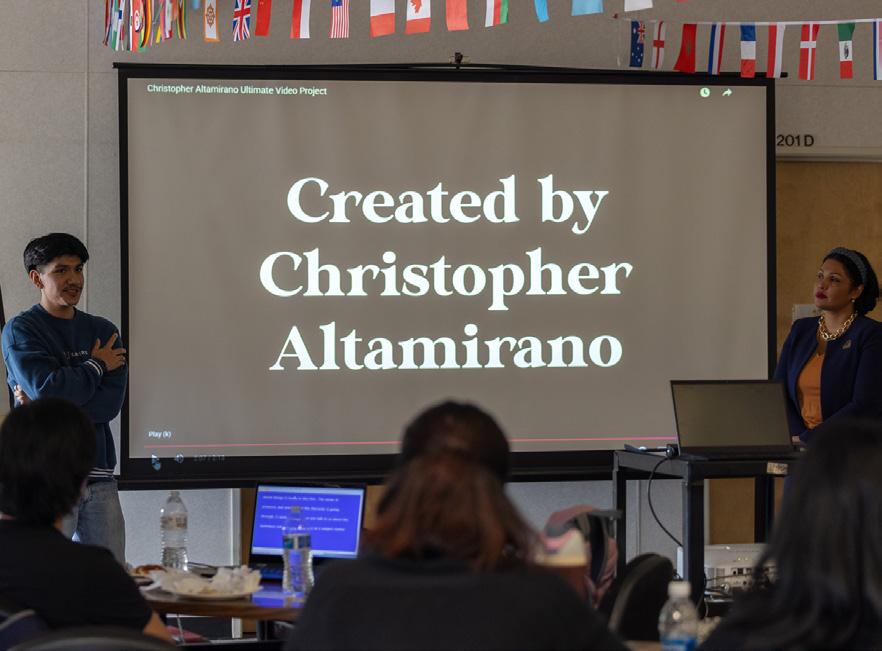
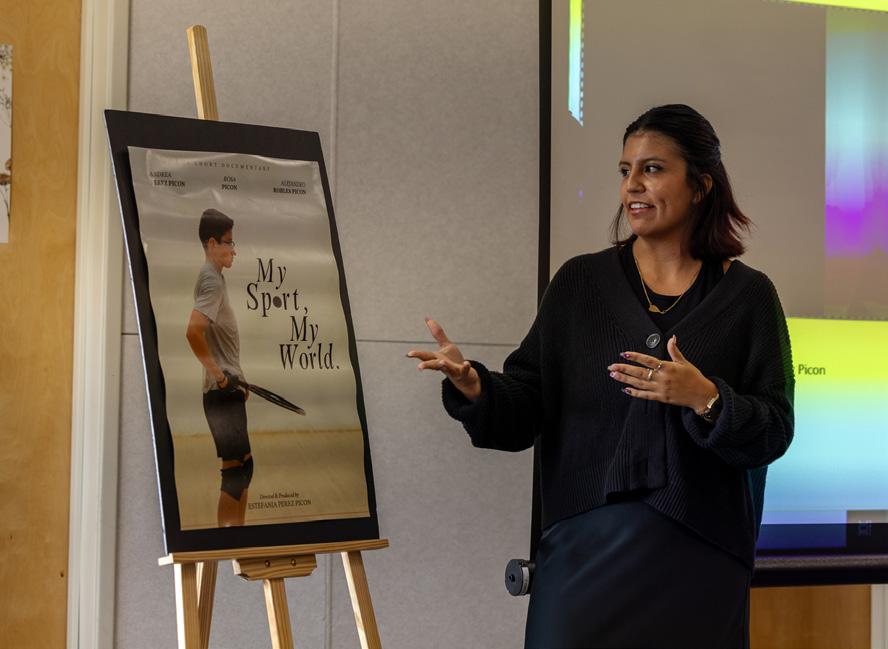
racquetball shaped her family’s identity and resilience after facing much adversity.
Picon, a first-generation college student who has played racquetball for 15 years, said the film showcases her siblings’ journey from junior Team USA to becoming world champions for Mexico.
Picon said her siblings, Andrea and Alex Picon, were mistreated by coaches during a 2023 tournament in Boliv -
ia while competing for junior Team USA.
They moved to Mexico for two months to try out for the national team, made the roster and later faced their former U.S. teammates in competition as World Champions.
Picon said their story inspired her because they persevered despite being so young.
“Sometimes you don’t feel like you’re enough as a
first-generation student,” Picon said. “You try to please everyone, but you don’t please yourself sometimes. And it’s important to remember that you are more than enough.”
The event ended with the universal message that all Delta students are “más que enough,” whether first-generation, mixed heritage or still discovering their roots.
BY JEWELS ESTRADA Staff Writer
Studying is a fundamental part of any college student’s life. Finding locations where students can focus, learn, or practice their skills is important.
While seasons change, spots also may change. While many have designated spots that they frequent, there are Delta students who don’t know where they can go to find peace and quiet. Having multiple choices for study spots is important to reduce stress, increase productivity, and reduce distractions rain or shine, students have work due.
Luis Torres, 18, and Jacob Neloms, 18, often enjoy studying outside with fresh air to help themselves focus but also enjoy other spots to do their work.
“The study spots I go to are outdoors like this spot [brick barrier around trees in between Danner and Forum Hall], the library and Danner Hall,” said Torres.
While studying with Torres, Neloms agreed with Torres’ takes on the best spots.
“I usually study in the classrooms of the classes I’m taking,” said Neloms.
Araceli Arias, 18, would rather be outside studying than inside because she enjoys the fresh air. She said she enjoys focusing on her course work underneath where the second floor overhangs Budd or Locke buildings.
“I’m typically under Locke on the benches but I also come here under Budd and study at this spot (benches by Budd),” said Arias.
Students like Abigail Lujan, 24, and Dangelo Louis, 18, both enjoy the quiet of the Goleman Library, but said that it can be very busy at times, with few spots to study.
Business Major DeAdrian Moore, 19, said he enjoys spending time studying on the table on the second floor
• Science & Math Building concrete tables
• Benches in middle of quad
• Canopy by Forum Hall next to Locke
• Concrete benches by Bookstore
• Benches by Budd
• Benches by Locke
• Concrete Table by Locke Lounge entrance
• Koi pond steps
• Garden by back entrance of DeRicco Student Services
• Goleman Library or in study rooms you can reserve
• Danner Hall
• Tables at DeRicco Student Services Building entrance
• In classrooms of courses you are taking during Professors’ Office Hours
• Dreamers Success Center
• EPIC Center
• Tutor Center
• The Zone (Athletes only)
of Holt Building or in his music classes.
While students here at San Joaquin Delta College find their own spots to focus their minds, the need for more indoor locations especially during these weather changes and cold fast approaching.
Many indoor spots are needed because indoor locations like Goleman Library are packed with few spots to go to and will only get busier as it gets colder outside, while Danner Hall can be very loud and hard to focus because of the people eating or playing video games.
Locke Lounge is a potential study space, but it is not
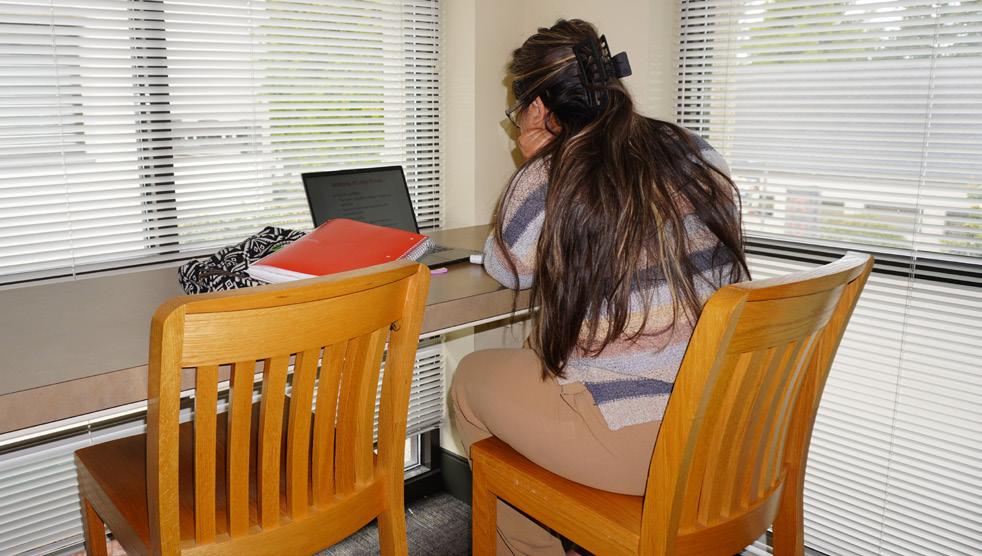
currently open to student use.
Delta College Director of Marketing and Communications Alex Breitler confirmed that Locke Lounge remained closed to student use, but noted locations for other possible indoor study locations.
“Currently, Locke Lounge is being used to host events, and the space has to be reserved through our usual process. So you are correct, it’s not currently available as a drop-in study space,” said Breitler.
Breitler said there are other possible other indoor spaces that are free to use by all students without being a part of said programs like the tutoring centers, the Dreamers Success Center, and the EPIC Center.
READ MORE ABOUT LOCKE LOUNGE AT DELTACOLLEGIAN.NET
BY JOHN NGUYEN Feature Editor
A campus-goer that visits Danner Hall to grab a bite or find a place to study, will get very familiar with the atrium in the center of the building once they take a seat. Enclosed in glass from all sides, the atrium is typically locked from campus-goers during Danner Hall’s normal operations.
When asked why the atrium was locked, Stacy Pinola, director of Facilities Planning and Management, replied that she had put out a reminder that the atrium is to be unlocked when Danner is open. The atrium remained locked on Oct. 6. According to Pinola, the atrium was designed as an outdoor space for campus-goers to meet and collaborate, with the
water features being a point of attraction.
However, the water features in Danner Hall at the atrium and by the Health Unit are broken, with leaks into the crawlspace. Pinola notes that Facilities is working with the Purchasing Department to find a vendor to repair the water features in Danner Hall as well as the Locke and Shima Centers. The Locke and Shima water features have been previously discussed in board meetings as part of beautification efforts, including a recent July 15 study session.
As of Monday, both water features in Danner Hall were in operation with running water. Meanwhile, the Locke and Shima water features remain inactive.
Nate McBride, assistant di-
rector of Auxiliary Services at Delta, said on Sept. 9 that he lacked knowledge on the usage of the atrium. Outside of Danner Hall’s normal operations, the atrium has seen recent use as a venue for the Delta College Foundation’s annual Black and Gold Gala, which took place last Saturday on Oct. 4. Looking through the glass walls and doors, the atrium in Danner Hall may present a window to new opportunities to improve campus livelihood among other additions to the space. Since the Fall Semester began, Danner Hall has seen new developments such as the return of the Mustang Grill service. New plans have been proposed for Danner Hall as well; Niven Enterprises presented a new layout for Danner Hall
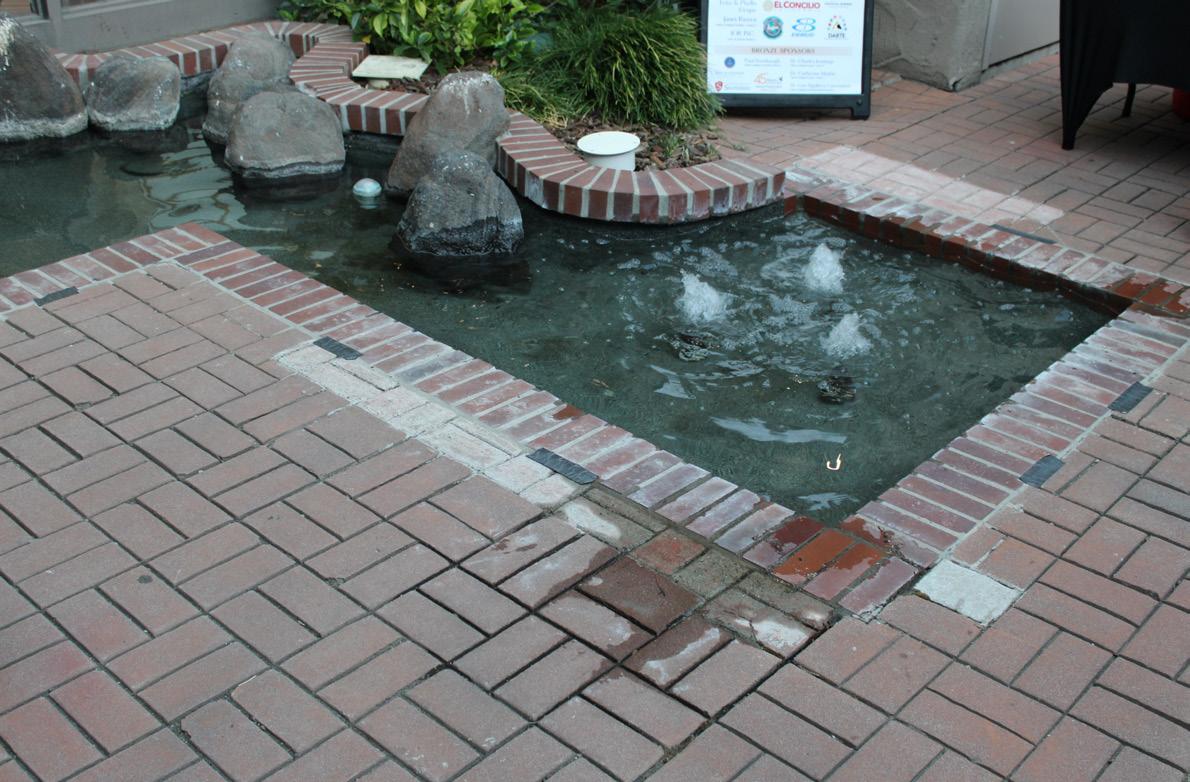
that included a ramen bar and a Subway at an Aug. 15 board meeting. The Niven recommendation is still in the con-
sideration phase and Auxiliary Services may look into other plans for Danner Hall.
BY ZACKARY KIRK-NEWTON Editor-in-Chief
On Oct. 4, the Delta College Foundation held its fourth annual Black and Gold Gala in Danner Hall.
The gala, which started in 2022, happens in early fall and serves as a way to spotlight programs and initiatives at Delta to local partners and potential donors.
“This is a great chance to bring donors and our community partners, just to attract an audience that may not always have the opportunity to see or hear or learn about what we’re doing,” said Joseph Feneck, the executive director of the Delta College Foundation, which serves as a non-profit fundraising arm of the organization.
The night began with a reception, including food and music performed by the Mike Belasco Jazz Quartet, a band made up of students and alumni.
When the clock struck 7 p.m. welcome remarks started with Feneck.
“Tonight is an opportunity to showcase, not only our college and its programs, but also to celebrate the impact that you make,” said Feneck addressing the crowd of 200, including several donors, staff, faculty, and board members, which marked record-breaking attendance for the event.
Following Feneck, several others spoke including President of the Delta College Foundation, Ben Cantu, Superintendent/President of Delta College, Dr. Lisa Aguilera Lawrenson, President of the Board of Trustees, Janet Rivera, and student representative, Dylan Myers.
The evening included presentations by a few programs, starting with the South Campus at Mountain House which began with the announcement that Mountain House would be receiving permanent buildings.
“I’d like to thank Dr. Lawrenson and the board of trustees for keeping that dream alive and pushing for measure K with a lot of hard work, ” said Dr. Pablo Ortega, the Mountain House
campus, which opened in 2009, mainly consists of portables despite a full campus being a part of the plans for Measure L.
“We just closed yesterday, at 3 o’clock, the bids for the bridging architect,” said Ortega. “So that’s the first level of architecture that comes out and there’ll be another architect after that.”
Following that there was a showcase from the Cisco Networking Academy located at Mountain House which partners with digital communications giant, Cisco, to provide industry-level training and pathways to careers.
“The fact that we are a Cisco Academy gives us that bridge to make it possible that all of our students graduate within a one year program and obtain a salary in the neighborhood of about $80,000 starting,” said Sergio Calderon, who serves as not only the instructor for the Cisco Networking Academy but also as a liaison to industry partner.
“We have 52 industry partners right now that at any one time, I’ll get a phone call saying ‘we need technicians,’” said Calderon. “I’ll get the resumes put together with the students and send it to them.”
The theme of industry readiness continued as the spotlight shifted to a program from the Stockton campus, Electron Microscopy.
“We have, what we like to call at SJDC, a little hidden gem known as the Electron Microscopy program,“ said Rachaellien Trinh, a professor in the program with nearly 20 years of experience in the field.
That gem did need its fair share of polishing however, with setbacks being apparent to even students at the time.
“I’ve been through the program and I’ve seen its ups and downs,” said Rosemarie Moris, an alumni of the program. “Some of our professors didn’t care much. Things felt unorganized. The resources weren’t always here or available to us.”
Over the course of her time in the program Moris saw it change however, growing into

Top: Delta College Foundation Director Joseph Feneck speaking at the 2025 Black & Gold Gala on Oct. 4 in Danner Hall at Delta College. Right: President of the Delta College Board of Trustees Janet Rivera speaking at the 2025 Black & Gold Gala on Oct. 4 in Danner Hall at Delta College. Bottom: Delta College Alumni Rosemarie Moris speaking at the 2025 Black & Gold Gala on Oct. 4 in Danner Hall at Delta College. PHOTOS
BY LEVI GOERZEN
what it is today.
“I saw all the hard work, adjustments and the commitment to the people behind it, everything, everything just started growing,” said Moris.
Trinh said there is still more work to do.
“We’re building really, really fast, and everybody’s knocked on my door, and I don’t have enough students to give them,” said Trinh to the crowd. “We want to continue to build it to a four year degree program. We’d like to invite the support of those who can and are willing to help build this into somethingThegreat.”
night ended with Crystal Joy, an ambassador from the
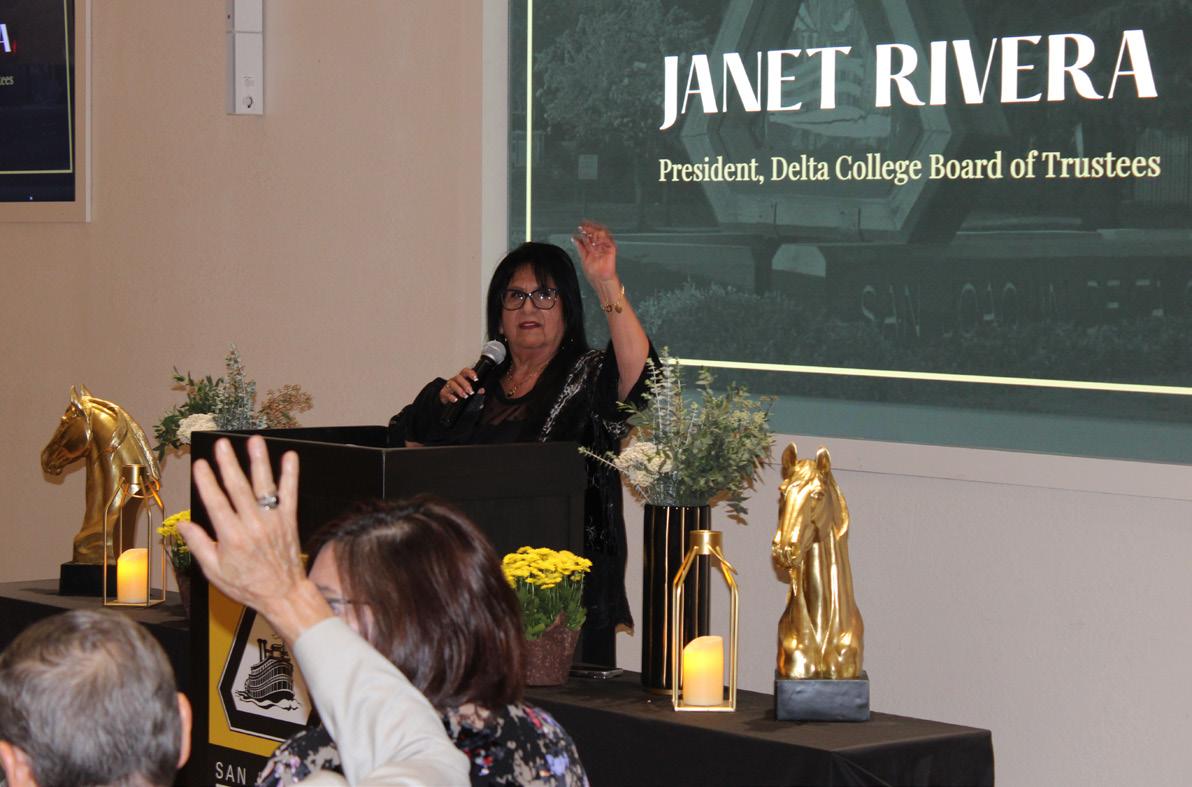
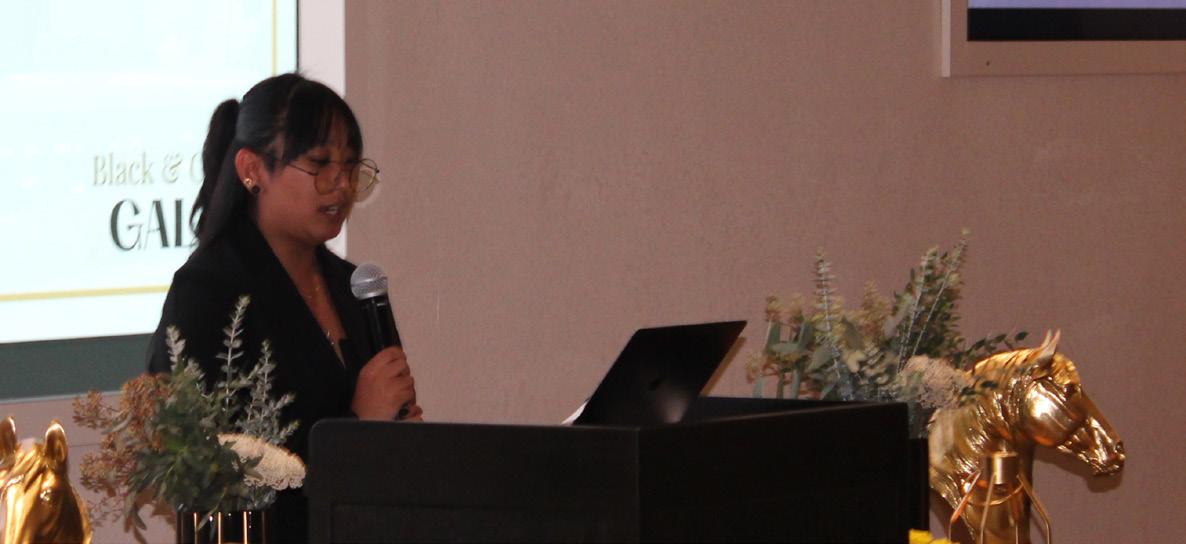
DARTE program who spoke about overcoming addiction and getting a career in substance abuse counseling. Joy received a standing ovation for her speech.
“I heard a saying the other day ‘It takes a village to raise
a child’,” said Joy “no, It takes a community and resources to help an adult succeed."
Editor's Note: Collegian advertising funds paid for tickets for three editors to attend the gala.
BY LUCIA NOEL Staff Writer
Opening night of “Marisol,” written by José Rivera and directed by Karen Vance, is Oct. 10 at 7 p.m. in the Tillie Lewis Theatre. Delta Drama students spend weeks reading through and practicing the play for their performances.
The show’s playwright, José Rivera, premiered “Marisol” at the Humana Festival of New American Plays, Louisville, Kentucky in 1992 and won an Obie Award in 1993 for playwriting.
“‘Marisol’ follows the self-reliant Puerto Rican woman, Marisol Perez, through a disintegrating apocalyptic landscape where natural laws are broken,” Vance said. “She grapples with her faith and seeks stability amidst the chaos after she is visited by her guardian angel and told that God is dying and an angelic war is going to be waged for the soul and the salvation of
humanity.”
When asked why she chose this play, Vance explained: “As a Puerto Rican woman, it’s pretty awesome to be able to produce a play where the titular character embodies that representation, especially during Hispanic Heritage Month. The themes of the story also felt really timely.”
Jacky Castro, the actress playing Marisol, is in her fourth year with Delta Drama. She says that the most difficult part of the process was taking the time to understand the universe the play was set in.
“It’s been a crazy ride playing Marisol,” she states. “There are so many hidden meanings behind this text that it has you constantly thinking.”
“I think it has a really important message for the world we are in right now,” said Spencer Buckman, 2nd year Delta Drama student. “It talks about classism and poverty, bigotry,
racism, and sexism and it gives a lot of messages about hope and doing something that people need to hear right now.”
Buckman is playing the role of Lenny, his first lead male role at Delta.
“He has been quite a difficult role for me and in the nicest words, he’s a creep.” he said. “But it is my job as an actor to bring him justice in the end. My goal is to find something right for him.”
In addition to the work being put in by the actors, there are several crew members working behind the scenes to ensure a successful performance.
Assistant Stage Manager Cherri Maie Crouson is on their second year with Delta Drama. They didn’t think theater is where they would end up, but are very involved and happy to be there.
Crouson has also been involved in two productions as an actor in Delta’s theatre.
Joseph B. Tran, Stage Manager, was never in theater before coming to Delta college, but quickly fell into it.
“I was reluctant at first to do theater, but once I saw the shows and how serious people in our age group took it, it appealed to me a lot,” said Tran. “I got sucked into the story telling and how they were performing, and I was like, ‘If they can do it, I can do it!’ and so I did.”
Tran is also the social media marketer for Delta Drama.
“I wanted to be a stage manager because I like helping, and like to get a feel of every part of theater,” Crouson said. Throughout their high school years, Crouson was involved in their high school Drama Club, acting in plays and being a part of crew for two.
“My goal with the marketing for Delta Drama is to show that we are at the same level as Universities and that we are capable,” Tran added.
Many members of the cast and crew are impressed by the high standards kept inside the theatre department.
“I’m absolutely blown away by the levels of professionalism, care, and passion within our theater,” Buckman said.
Delta Drama’s directors are highly trained and renowned, having worked for other theatre companies in the past.
“It’s definitely nice to have professors that are passionate about their work,” Crouson added.
Show dates for “Marisol” include: Oct. 10, 11, 17 and 18 at 7 p.m. and Oct. 12 and 19 at 2 p.m. All productions are held in the Tillie Lewis Theatre, located in the Locke building.
Tickets can be purchased at the Box Office or online. Additional fees will apply if buying online. It is $7 general admission or $5 with student ID.
BY BELINDA SEIBEL Entertainment Editor
WithPresident Donald J. Trump administration threatening access to information and book bans, it is important to stay informed now more than ever.
Trump signed an executive order on Mar. 27, 2025 to review information in the Smithsonian Museums because of “divisive, race-centered ideology,” and states Florida and Texas are numbers one and two respectively for banned books in public libraries in 2025 according to PEN America.
Staying informed and reading books is one way to expand our worldview, and an important part of activism is learning theory to inform our decisions in the real world.
At least nine states have passed anti-book ban legislation, including California that passed AB 1825, California Freedom to Read Act, in 2024 to protect the right of public libraries and school libraries as informational institutions.
There are plenty of different types and genres of literature people can read, whether that be long historical novels like “A People’s History of the United States” by Howard Zinn or short, important letters such as “Letter from Birmingham Jail” by Martin Luther King Jr, there is a never ending well of information available.
club United Minds Empowering Coalition at Delta College and member of music-based social welfare organization The Bad Planet, recommends reading “Pedagogy of the Oppressed” by Paulo Freire to anyone who’s getting politically active for the first time. Freire discusses how education will empower the people to fight for their collective

pressed” by Augusto Boal, which talks about utilizing the arts in political activism.
“That's another huge influence for me with Bad Planet of using music for beyond just commerciality, with Bad Planet we play music with a purpose by getting involved in social activism,” said Bello.
Danielle Bush, Vice President of the Politics and Law Club and Senator of Legislative Affairs for Associated Students of Delta College, read “Assata: An Autobiography” by Assata Shakur over the summer, and describes how the overall theme of the novel is the racism embedded in America’s failing justice system.
“They attacked her, they tried to kill her, and she was still arrested for crimes that they committed against her, and she had to flee, and to this day she’s still in Cuba, and nobody will turn her over because they know that our justice system is broken,” said Bush.
Shakur passed on Sept. 25 in Cuba, she never was able to return to the United States.
BY ELENA CANDELAS Staff Writer
Gentlereaders, there is much amiss in Washington, D.C. While some families wonder where their next meal may will come from, President Donald J. Trump has little concern for these matters, placing greater importance on where he can host balls.
You see, in late July The White House announced its plans to build a ball room on the property, closing its doors to public tours as construction begins. The project will reportedly cost around $200 million. It is being funded by Trump and individuals the White House website refers to as “patriot donors.” I suppose the president thought it would be a nice reward for himself, while asking buddies to pitch in for his new play house.
While that’s being built, the president and his “patriot” friends can cozy up at the Rose Garden that has a new face.
Another renovation project by Trump he refers to as a “...great place. We call it the Rose Garden Club, and it’s a club for senators, for Congress people, and for people in Washington.”
PBS reporter Ali Rogin points out some notable decor choices: “There’s new patio furniture and umbrellas with bright yellow accents resembling Trump’s club in Florida, Mar-a-Lago.”
This resemblance could be by pure
coincidence or Trump could have missed his sunny Florida estate. Adorned with the yellow umbrellas and Washington’s high society I’m sure he will soon feel at home. But is it a palace for the people? Likely not good friends.
It’s not clear if by “people in Washington” he meant citizens or the touring population. However seeing as the White House is currently closed to tourists one can deduce it’s more likely than not meant for the people on the Hill and others close to them.
They can enjoy food made by the White House kitchen while some American families worry about their SNAP benefits taken from them in accordance with the Big Beautiful Bill.
The White House refers to the previous setup of tents at the White House for large events as “unsightly.” We can’t have that, of course. Maintaining public image and decorum is of the utmost importance when hosting those “patriot” friends and foreign dignitaries.
It’s true decor is a personal opinion matter but what I find to be far more unsightly is the state of our country.
A ballroom isn’t what we need, dear reader. Not when lives and liberty are at stake.
Within the current state of our country I’ve had many worrisome mornings. I worry about the members of my family whom Trump and his administration have deemed less than human. As they
enter their worksite they are no longer safe.
The Supreme Court decision makes this worry far more real. In September, a ruling allowed ICE agents to stop and question people based on race, particularly their working class, skin color, and language. This wasn’t a final ruling but one that opened up the doors to sew further division and terror into already frightened communities.
Trump seems unbothered by the worksite at the White House. Dreaming of his ball room, knowing that his buddies or more accurately lackeys on the Supreme Court have no issue defying basic human rights to keep him happy. But not even he can outrun data.
The Bureau of Labor Statistics released a report in August 2025 showing unemployment at a stark 4.3 percent this is a .30 percent jump from the start of the president’s second term in office where he was handed a 4 percent unemployment rate.
That’s the opposite of progress.
This increased rate poses more concern when bringing into consideration the previously mentioned cuts and reforms to the SNAP benefits outlined in “One Big Beautiful Bill. “ These families are left out to dry by our government as those on Medicaid also face some cuts to their benefits within this bill.Even with these concerns that plague the everyday American it’s more import
BY AARON BRANDT Staff Writer
Onceagain, TikTok has been “saved,” according to President Donald J. Trump. On Sept. 25, Trump signed an executive order that would prevent TikTok from being banned in the U.S.
But there’s a glaring issue with the deal.
“This is going to be American-operated all the way,” Trump said while signing the order. “I have great respect for President Xi, and I very much appreciate that he approved the deal, because to get it done properly, we really needed the support of China and the approval of China.”
This executive order facilitated the sale of TikTok’s U.S. assets to several United States-based investors. Oracle is the primary company serving as TikTok’s new security provider and will monitor the social media site’s assets.
What is Oracle? It is one of America’s largest tech companies worth more than $800 billion. There’s probably a good chance you’ve never heard of them before
this deal. The company provides software, mainly databases and cloud computing services.
The issue with this new deal for TikTok, lies with the co-founder and current chairman of Oracle, Larry Ellison. Ellison played a “big” role in the deal according to Trump.
Ellison is considered a “Trump ally,” however he’s Netanyahu. So close in fact, that the two have vacationed together on Netanyahu’s private island according to several sources including The Guardian.
This raises several red flags.
The fact that this deal was being finalized just days after Netanyahu spoke to pro Israel influencers at Israel’s Consulate General in New York about social media being a “weapon” to influence U.S. opinion on Israel. He also specifically stated that he views TikTok as “the most important purchase going on right now,” alleging its control could be “consequential,” during his speech.
“You have to fight with the weapons that apply to the battlefield, and one of the most important ones is social media,” Netanyahu said while speaking to influ-

ant for the president to have a place where he can put on his dancing shoes. A tent will simply not do for his high society.
Division is unsightly, terror is unsightly, violation of our constitution is unsightly, poverty and childhood hunger are unsightly. These are issues that can’t be ignored by our government as they build ball rooms and clubs. Tents are a perfectly bearable sight when putting into consideration the issues that haunt the people outside of them.
I suppose they simply expect the people to enjoy some cake, not on the government dime though that is far too great a luxury.
encers in New York.
What does this mean for TikTok?
With Netanyahu’s close friend and staunch Israel supporter, Larry Ellison now overseeing TikTok and its algorithm, this is going to mean that Israel can now influence what is promoted on its platform. Potentially silencing any and all anti-Israel opinions.
Israel is losing the support of Americans hard. Overall, the percentage of U.S. adults who express negative opinions towards Israel has shot up over 10 percent (42 percent to 53 percent) from 2022 to 2025 according to a survey done by Pew Research Center.
They are especially losing support among the youth.
The same survey showed that Republicans aged 18-49 have shown a 15 percent increase (35 percent to 50 percent) in negative views towards Israel since 2022.
The same phenomenon occurred with Democrat voters in the same age range. Their percentage has increased by 9 percent (62 percent to 71 percent).
This is why Netanyahu views the TikTok sale as “consequential.”
Israel and Netanyahu need American support to get what they desire out of the Middle East. Especially with their ongoing conflict with Hamas and Iran. They want to use TikTok to get that support.
BY ANDREA BALTODANO Editor-in-Chief
JimmyKimmel’s return to latenight television after a brief suspension might have looked like business as usual. It wasn’t. His show was pulled off the air for six days after comments about the assassination of conservative activist Charlie Kirk.
First Amendment, which once felt like a permanent guarantee, now feels conditional.
dissent.

Kimmel said in his monologue mid September that the “MAGA gang” was “desperately trying to characterise this kid who murdered Charlie Kirk as anything other than one of them” and of trying to “score political points from it”.
“The president of the United States made it very clear he wants to see me and the hundreds of people who work here fired from our jobs. Our leader celebrates Americans losing their livelihoods because he can’t take a joke,” Kimmel said during his return monologue to late night.
with ANDREA BALTODANO
The show shortly returned after six days of backlash to Disney from the public. But the message was clear: speech can be punished, even when it comes from one of the most mainstream voices in American culture.
That is the reality of President Donald J. Trump’s second term. The
Trump has never hidden his contempt for free expression. He branded the press as the “enemy of the people” during his first term and returned to office with sharper tools, according to the Committee to Protect Journalists. His allies now openly threaten broadcasters with regulatory action.
Federal Communications Commission officials have signaled a willingness to scrutinize content critical of the administration. The chilling effect is already visible, not only in Kimmel’s suspension but in how local outlets and universities weigh the risks of
“We can do this the easy way or the hard way. These companies can find ways to change conduct and take action … on Kimmel or … there’s going to be additional work for the FCC ahead,” Chairman Brendan Carr told Benny Johnson, a right wing podcaster, noting that licenses come with “an obligation to operate in the public interest.”
Groups that monitor global freedoms are also noticing. CIVICUS, a watchdog coalition, downgraded the United States this year to “civic space narrowed.” That designation places the country closer to democracies under strain, where governments permit limited criticism but punish those who cross invisible lines, including Pakistan, Serbia and Democratic Republic of Congo.
For students and journalists like me, the erosion is not theoretical. It shapes the air we breathe. I write this column at a community college newspaper in Stockton, aware that my ability to question, criticize and analyze is both protected and precarious. The borderlines I navigate are not only about
immigration status or politics but about the fragile space where speech is tolerated.
I do not take for granted that I can write these words. I come from Nicaragua, where independent media has been shuttered and citizenship revoked for those who refuse to stay silent. Exile taught me that rights vanish quickly when power is unchecked. Seeing echoes of that experience in the United States, a country that prides itself on being a global defender of free speech, is both painful as it is clarifying.
Critics will argue that Kimmel crossed a line, that consequences are part of responsibility. But the broader pattern is undeniable: when political pressure determines who can speak and who cannot, the First Amendment becomes a privilege instead of a right. I do not know if tomorrow I will still have this platform. What I do know is that silence helps no one. The only way to defend free expression is to keep using it: loudly, critically, and unapologetically.
So I’ll keep asking: does anyone know if we have the First Amendment tomorrow?
BY RYCKIE HEREDIA Staff Writer
TheStop Ineffective Paper Straws (SIPS) Act, proposed by Rep. Darell Issa to the U.S. Congress in August 2025, would significantly limit the amount of plastic products available to consumers.
As a result, manufacturers, retailers, and local governments would have to adjust. There could be broader bans on single-use plastics, new national recycling regulations, and a greater focus on models for a circular economy and waste management.
Issa, who represents California’s 48th Congressional District, which includes parts of San Diego, introduced the bill, which was referred to the Committee on Oversight and Government Reform.
Although this is done with good intentions, the reality will likely mimic repeated failures to clean up the environment that have already been passed and stalled out due to a lack of action. To enforce rules against various sources of pollution, like workplaces, farms, and people’s actions, we need advanced methods for tracking and regulation.
In that way, we don’t provide monitoring. This latest bill notes heavy enforcement, but will that actually happen?
Think about the complaints from authorities that should know.
In “Why Is Environmental Policy Enforcement
Weak?” from May 2025 Sustainability Directory notes the weak enforcement involved in oversight and expresses concern for environmental well-being.
The American Society of Safety Professionals said in its “EPA Announces Workforce Restructuring and Staff Reductions” in July 2025 that workforce reduction — a commonality in government these days — could make things even harder.
“While the EPA emphasizes its continued commitment to science, environmental and public health, observers note that a significant workforce reduction could affect the agency’s ability to respond to complex environmental challenges,” the article said.
In keeping with the issues, greater examination of systemic defects and the complicated structure of power is required to understand the reasons behind the poor enforcement of environmental policies.
“Often, there’s a significant gap. This gap widens when the resources allocated for enforcement are insufficient, or when the political will to prioritize environmental concerns wanes in the face of economic pressures or other competing interests,” Sustainability Directory said.
The environmental regulations enacted before the SIPS Act include the California Environmental Protection Agency (CalEPA), California Air Resources Board (CARB), California Environmental Quality Act (CEQA), Clean Air Act, and Clean Water Act.
Although these acts have different goals, they all have a common priority for protecting the environment:
The Clean Air Act establishes national air quality standards and mandates that states create plans for carrying out to satisfy them to protect the environment and public health.
The Clean Water Act is a primary federal law in the U.S. that protects the nation’s water quality by preventing, reducing, and eliminating water pollution.
All over the nation, environmental protection is still based on these established rules. Additionally, state laws and even common law concepts continue to be useful in addressing more localized problems and fixing any gaps that may exist between federal law and state law.
“Powerful industries can exert considerable influence on political decision-making, sometimes prioritizing short-term economic gains over long-term environmental sustainability … The result is a system where the ‘rules of the game’ are not consistently applied, undermining the effectiveness of environmental policies,” said Sustainability Directory.
Actions are currently in place, but if there’s no change to the enforcement of laws related to sources of pollution, such as industries, agricultural difficulties, or individual activities, as well as monitoring and regulatory systems. Even with the other acts and mandates mentioned above, the government still wishes to enforce the SIPS Act.
But will there be any sort of change?
BY ANDREA BALTODANO Editor-in-Chief
Editor’s Note: The Collegian is not disclosing the name of the transgender athlete, as the student has not spoken publicly.
Delta College reaffirmed its commitment to inclusion on Oct. 3 as students, faculty and staff gathered to support a transgender athlete from Santa Rosa Junior College (SRJC) following protests weeks ago.
Members of the Delta College Pride Coalition, along with the Associated Students of Delta College, the Dreamer Success Center, and campus allies, gathered before the game to express solidarity with the visiting student-athlete.
Signs with messages of inclusion and trans pride were placed across campus.
“Meeting the athlete’s mother was a highlight,” the Pride Coalition wrote in an Instagram post. “This was an amazing night of collaboration and joy. We all gathered together and shut down the hate.”
The event brought together student leaders, college staff, and campus police in a coordinated effort to ensure safety and a welcoming atmosphere. The coalition credited Delta’s student government, Pride Center leadership and students, Dreamers Center, and college administration for helping organize the show of support.
Professor Kirstyn Russell, president of the Pride Coalition, said the demonstration reflected how years of advocacy have built a culture of quick, collective action.
“Showing support is being visible in your activism,” Russell said. “This event showed that all the work we’ve done in different areas of the campus has made it possible to mobilize quickly. We are much safer when we are together. I don’t want anyone to feel alone, even if they can’t safely join gatherings like the one on Friday.”
Protesters first gathered outside Sierra College in Rocklin
in mid-September, when SRJC visited for a women’s volleyball match, KCRA reported. The demonstration came after three SRJC players filed a Title IX complaint against SRJC and the women’s volleyball team’s coach earlier in the month involving a transgender teammate.
Title IX is a federal civil rights law that bans sex-based discrimination in schools and colleges receiving federal funding, according to the Department of Education.
“No person in the United States shall, on the basis of sex, be excluded from participation in, be denied the benefits of, or be subjected to discrimination under any education program or activity receiving Federal financial assistance,” the policy reads.
According to the 23-page Title IX complaint filed with the U.S. Department of Education’s Office for Civil Rights, three SRJC volleyball players allege that the school “violated Title IX by allowing a trans-identifying male to participate on the women’s volleyball team.” The filing states that the student “did not compete in matches during the 2024 season but practiced and worked out with the SRJC team,” and that during one practice she “injured a teammate by striking the volleyball at her head, causing a concussion.”
The complainants — Madison Shaw, Gracie Shaw and Brielle Galli — claim they were “benched and ignored” after raising concerns to the coach and athletic department. They argue that SRJC’s actions amounted to “physical endangerment,” “deprivation of women’s rights,” and “retaliation,” and call on the Department of Education to investigate alleged violations by Santa Rosa Junior College, the Sonoma County Junior College District, and the California Community College Athletic Association (CCCAA).
The complaint was posted online by ICONS (Independent Council on Women’s Sports),

Top: ASDC Secretary Angelina Ochoa-Cruz talking to ASDC Senator at large Tina Rocha before a volleyball game on Oct. 3 by the Shima 1 parking lot. Right: A sign put up by the Delta College Pride Coalition before a volleyball game on Oct. 3 by the Shima 1 parking lot. PHOTOS
BY MAX OLMSTEAD
a Nevada-based organization that opposes the inclusion of transgender athletes in women’s sports. The group has previously filed or supported similar Title IX complaints nationwide, arguing that policies allowing transgender participation “erase opportunities for female athletes,” according to its website.
In a statement to the San Francisco Chronicle, SRJC spokesperson Sarah Pew said the school “is committed to fostering an inclusive and supportive environment for all students and employees.”
“The District complies with California Community College Athletic Association (3C2A) regulations, which govern student eligibility and participation in our athletic programs,” Pew said. “We respect the legal privacy rights of all students and cannot discuss individual circumstances. What we can affirm is that SRJC takes all reports seriously and responds through established procedures.”
The California Community College Athletic Association (3C2A), which oversees athletics for both institutions, upholds nondiscrimination policies al-
lowing transgender athletes to compete in accordance with their gender identity, in line with state law.
At Delta, the tone was notably different from the protest.
The Pride Center described the evening as one of “collaboration and joy.” The Mustangs defeated Santa Rosa 3–0.
Delta’s Pride Center offers a welcoming safe space for LGBTQ+ students and allies, working through partnerships with campus and community groups to facilitate support services, advocacy, and visibility programming. The center administers programs such as the Pride Scholars and hosts events like Lavender Graduation.

ball game also underscored how allyship can take creative and positive forms, especially during tense public debates.
While the college doesn’t publicly list total participation numbers, the Pride Center regularly organizes workshops, support groups, and community events that engage dozens of students each semester.
Russell said the volley-
“We approached the volleyball game as an opportunity to express joy and celebration for the trans community,” she said. “It’s important to react to hate with positivity. The LGBTQIA community has always incorporated music and art into our protests — by joining together, no matter your identity, you create a powerful protection without adding to divisiveness.”
BY MAX OLMSTEAD Staff Writer
On Oct. 3, the Mustangs took on Santa Rosa Junior College in the Ernie Marcopulos Gymnasium in a 3-0 win.
In the first set, No. 5 Morgan Lung served, Santa Rosa scored the first point. After which, the Mustangs bounced back scoring six consecutive points.
After the first timeout, No. 3 Catherine Frias, No. 1 Paige Taylor and No. 4 Hadlee Gray delivered a great series of plays, the three of them working together to score four more consecutive points for the Mustangs. With the second timeout at 13-2, the Mustangs were swiftly taking the lead.
Nearing the end of the first set, Catherine Frias kept the lead with a series of service aces. No. 9 Mia Alomia delivered the final spike, ending the first set with a score of 25-5.
In the second set, tension was high between the two teams with Santa Rosa beginning to pick up the pace. Despite Santa Rosa’s determination, by the first timeout Delta was in the lead with a score of 13-5.
Both teams struggled in the second set with a few plays hitting the net or plays being out of bounds, furthering the competitive spirit. The Mustangs ended the set with a strong 25-15 score.
The third set was full of strong defense from the Mustangs. At the start of the set, Hadlee Gray blocked a series of plays from Santa Rosa, earning her the highest attack statistics for this game, No. 10 Emily Yarbrough and No. 423 Jordan Beers were also strong on the defense, contributing to many of the team’s strategic plays.
Finishing the set, Morgan Lung scored the final point, earning the final score of 25-10 and winning the game.
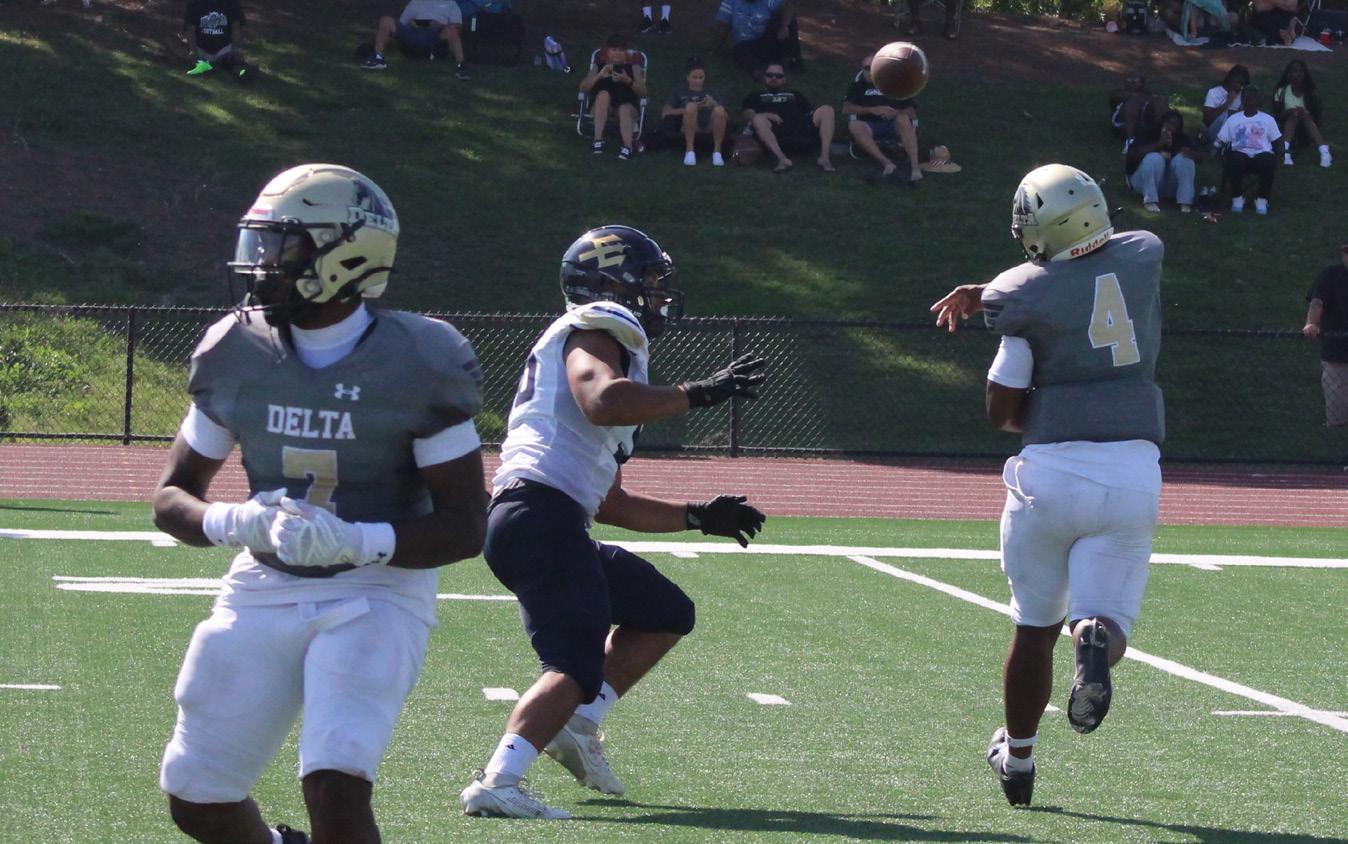

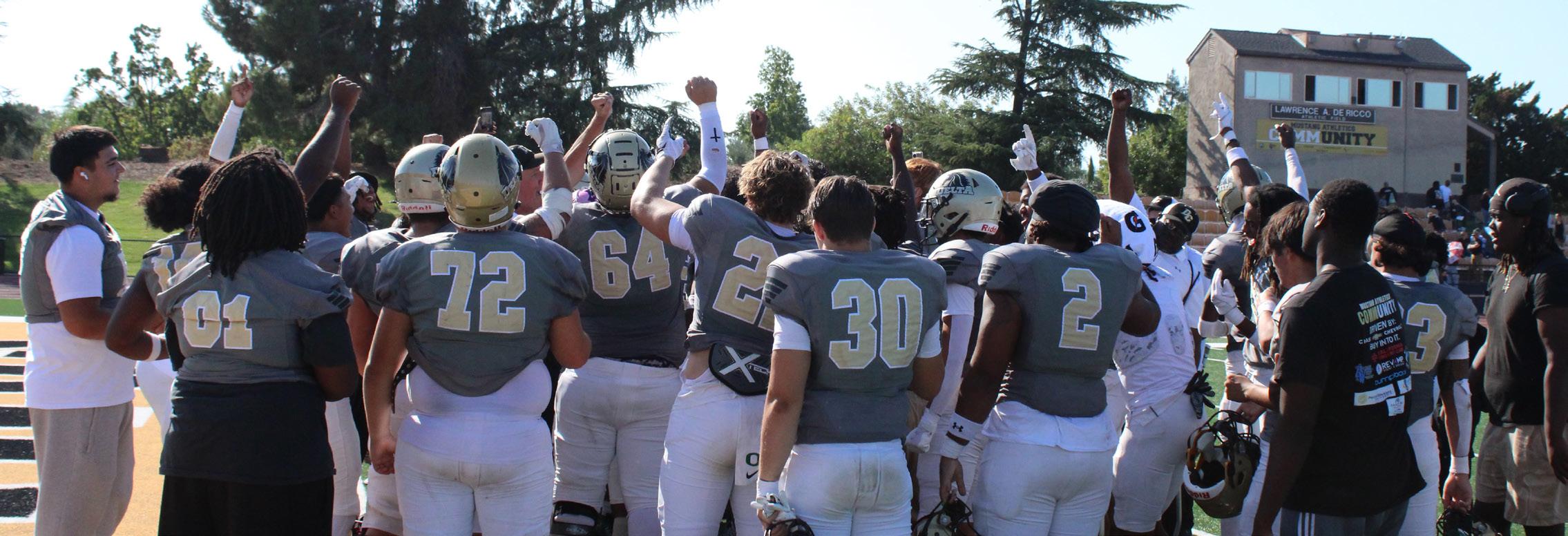
tangs up 7-0.
On Sept. 27, the Mustangs football team beat the Merced Blue Devils 4924, improving to 3-2 overall and the Mustangs’ first winning record going into conference play since 2015.
To start the game, the Mustangs received the kickoff, which running back Maurice Griffin Jr. took 39 yards from Delta’s 10-yard line.
“I knew to open up the game, I have to set the tone. I pretty much just went into the left all the unblocked players missed, then I went to the right, and I got daylight, then I started off our drive at the 50,” said Griffin Jr.
After three quick run plays to move the Mustangs up 21 more yards, a 48yard touchdown pass from quarterback
Ubedei McGautha to wide receiver
Treavon Spivey would put the Mus-
Mustangs kicker William Henderson would kick a touchback to put the Blue Devils at the 25-yard line, where they would throw an interception to defensive back Darion Stroman at the Blue Devils 48-yard line.
“My first pick, I didn’t even know I had it in my hands, it just dropped in my hands and stuck there,” said Stroman.
The interception led to another touchdown for the Mustangs, and a 23yard pass from McGautha to Griffin Jr. put the Mustangs up 14-0.
The Mustangs would then recover a fumble on the kickoff return, giving them the ball back at the 15-yard line, where running back Julian Benton would run it in to put the Mustangs up 21-0 in the first 5 minutes of play.
In the second quarter, the Blue Dev-
ils would put up 17 points with two touchdowns and a field goal, while the Mustangs scored 21 with two rushing touchdowns from Griffin Jr. and a rushing touchdown from McGautha.
Both teams went scoreless in the third quarter, and each team scored a touchdown in the fourth quarter, for a final score of 49-24.
Head Coach Gary Barlow attributes the success to the Mustangs’ winning attitude on and off the field.
“I think we have a really strong culture, I think our players work hard in the weight room, they work hard academically, and they work hard when we get out on the football field,” said Barlow, “that hard work and ability to train is usually what produces success.”
The Mustangs’ next game is on Oct. 25 at Contra Costa to start conference play.